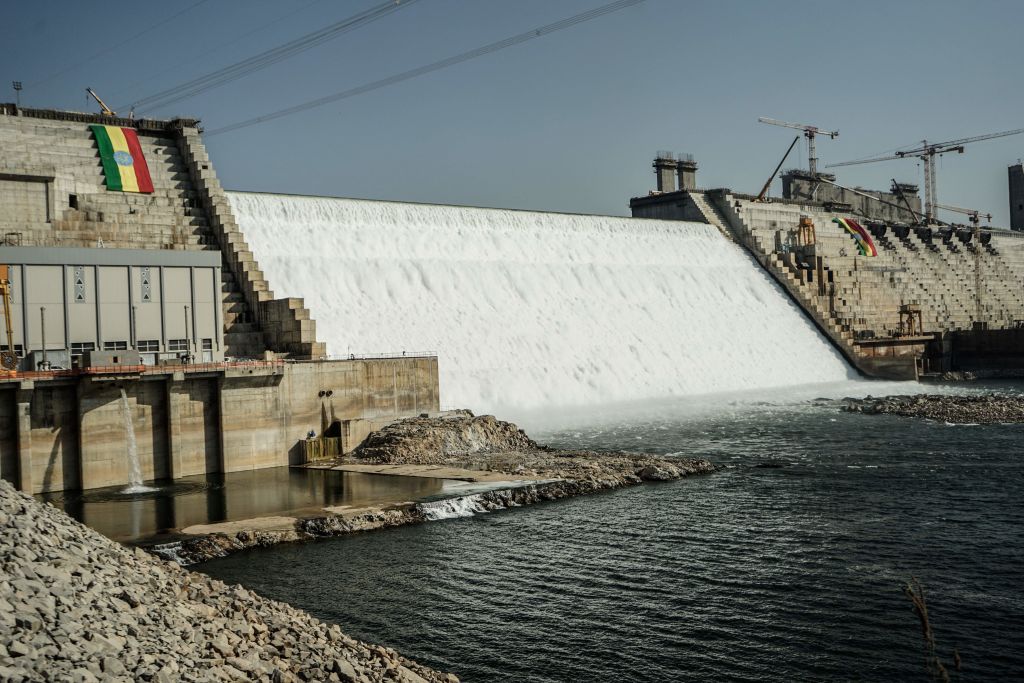With Dam Filled, Ethiopia, Egypt, Sudan Eye Return to Talks
ADF STAFF
Ethiopia recently completed the fourth and final filling of its huge Grand Ethiopian Renaissance Dam (GERD). However, the controversy the dam has created with Egypt and Sudan remains unresolved.
Ethiopian Prime Minister Abiy Ahmed announced the end of the multiyear effort to fill the dam’s enormous reservoir on September 10.
Ahmed’s statement provoked a testy response from Egypt, which has opposed the dam on the Blue Nile since before construction began in 2011.
“Ethiopia’s unilateral measures are considered a disregard for the interests and rights of the downstream countries and their water security as guaranteed by principles of international law,” Egypt’s foreign ministry said in a statement after Ahmed’s announcement.
Egypt and Sudan have their own dams on the Nile to provide water for irrigation and flood control. Egypt’s Aswan High Dam opened in 1970. Sudan’s Merowe High Dam opened in 2009. Sudan’s Jebal Aulia Dam, which opened in 1937, sits above Khartoum on the White Nile.
Over the past 50 years, 25 hydroelectric dams have gone up on the Nile and its two main tributaries with more in the planning or construction phases.
Despite the continuing tension over Ethiopia’s dam, Egypt, Ethiopia and Sudan recently resumed talks in July to work out a final plan by the end of this year for managing the project in a way that protects all three countries’ interests.
The return to the negotiating table ended a two-year stalemate during which Ethiopia continued planned fillings. Trilateral talks in Cairo in August ended without a resolution. A second round in Addis Ababa in September ended with promises to continue talking.
“Ethiopia is committed to reaching a negotiated and amicable solution through the ongoing trilateral process,” Ethiopia’s foreign ministry wrote on X, formerly known as Twitter.
Ethiopia sees the giant hydroelectric dam on the Blue Nile as vital to its economic future. The dam will provide electricity to millions of Ethiopians now living without power. The country can sell excess power from the dam to its neighbors to generate income. Sudan already has agreed to buy up to 1,000 megawatts of power generated by the GERD.
Ethiopia argues that because water flows through the dam to turn electrical turbines, the project poses no threat to downstream countries. It began generating power in 2022.
Experts argue that the dam could benefit Sudan, for example, by preventing seasonal flooding that inundates the capital, Khartoum, which sits where the White Nile and Blue Nile converge. It could help Egypt and Sudan by storing water as a hedge against drought caused by shifting weather patterns.
The Blue Nile makes up about 85% of the Nile River’s volume.
Because of that, Egyptian leaders say the dam gives Ethiopia the ability to shut off the flow of the Nile if regional conflict breaks out. Egypt gets 97% of its fresh water from the Nile, with more than 80% of that going to irrigate key agricultural crops such as cotton and grains. As its population continues to grow, Egypt has begun to modernize its agricultural methods to use water more efficiently.
Egypt wants a binding agreement to control how Ethiopia operates the GERD, a demand Ethiopia resists. Such an agreement, along with regional oversight, could avoid conflict over the GERD in the future, according to Sophie de Bruin, a researcher in environmental change at Vrije Universiteit Amsterdam.
“Water treaties and strong river basin organizations increase the likelihood of long-term, stable cooperation between states,” de Bruin wrote recently for The Conversation.
At the United Nations General Assembly meeting in September, Egyptian Foreign Minister Sameh Shoukry struck a hopeful note regarding the dam and the newest round of negotiations.
“We remain in anticipation of our goodwill being reciprocated with a commitment from Ethiopia to arrive at an agreement that will safeguard the interests of Egypt, Sudan and Ethiopia,” Shoukry said.
However, he added: “It would be a mistake to assume we can accept a fait accompli when it comes to the very lives of more than 100 million Egyptian citizens.”


Comments are closed.